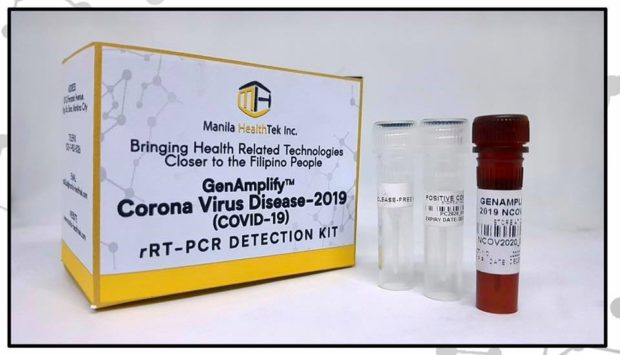
PHOTO from DOST PCHRD
MANILA, Philippines — The test kits developed by the University of the Philippines National Institute of Health (UPNIH) are expected to be used for confirming 2019 coronavirus disease cases starting next week, the Food and Drug Administration (FDA) said Wednesday.
“The commitment [of the UPNIH] is to start it within a week. So the target is Monday next week, and they are committed to 1,000 test a week,” FDA Director-General Dr. Eric Domingo said, speaking partly in Filipino, during a press conference at DOH main office when asked about the deployment of test kits, which are funded by the Department of Science and Technology.
The test kits, which can release confirmatory results in just two hours, had already been approved by the FDA to fast-track the testing of people being monitored for the fatal disease.
According to Domingo, since the UP facility could only accommodate a few tests per week, they will conduct a “selection of PUIs for testing.”
Health Assistant Secretary Maria Rosario Vergeire said test kits at the Research Institute of Tropical Medicine (RITM) in Muntinlupa City were “adequate” — that is, available for doing 300 tests per day for patients with COVID-19.
According to RITM, only persons under investigation (PUIs) for the coronavirus disease would be tested. PUIs are those with “flu-like symptoms, exposure to COVID-19 positive individuals, and travel history to affected countries with local transmission.”
As of this writing, the Philippines has 49 confirmed COVID-19 cases, two of which had already died. The disease came from the novel coronavirus, which was first reported from Wuhan City in China’s Hubei province in late 2019.
The International on Taxonomy of Viruses named the new coronavirus as SARS-CoV-2.
The novel coronavirus causes respiratory symptoms, including fever, cough, and colds. It can also cause serious illness, such as pneumonia, especially in older adults and people who are diagnosed with other health issues.
The coronavirus, a family of viruses, have surfaces with crown-like appearance. The viruses are named for the spikes on their surface.
/atm